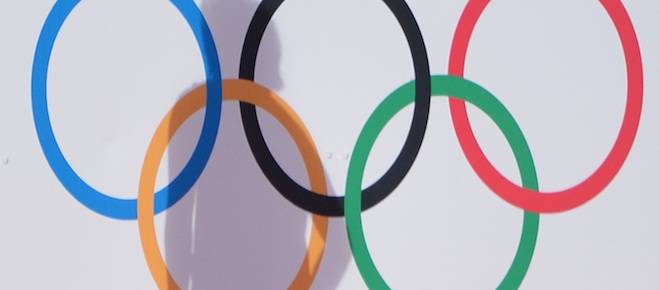Three golds does not make Britain a track superpower
Gold frenzy has the U.K. loving athletics as it did the Beatles. Alas, 1964 is long gone
A spectator wears Olympic rings sunglasses during the preliminary round women’s field hockey match of the London 2012 Olympic Games between China and Belgium at the Riverbank Arena in London on July 31, 2012. AFP PHOTO/ INDRANIL MUKHERJEE (Photo credit should read INDRANIL MUKHERJEE/AFP/GettyImages)
Share
 You have to go back some years to find a time when Britons got this excited about “athletics”—the connoisseur’s term for track and field. At least to 1988, when Linford Christie was doubling up on silvers thanks to He Who Must Not Be Named testing positive, and probably farther, to 1964, when Beatlemania was in full swing and the Union flag rose seven times for British track and field winners in Tokyo.
You have to go back some years to find a time when Britons got this excited about “athletics”—the connoisseur’s term for track and field. At least to 1988, when Linford Christie was doubling up on silvers thanks to He Who Must Not Be Named testing positive, and probably farther, to 1964, when Beatlemania was in full swing and the Union flag rose seven times for British track and field winners in Tokyo.
The country went home that summer with a whopping 14 T&F medals, a haul they won’t come close to matching this time.
Still, we’re told this is almost certainly the beginning of the U.K.’s athletics renaissance. Two nights ago at Olympic stadium, Team GB gathered three gold medals within 43 minutes, electrifying the country and turning all eyes to a sport that had fallen off the radar round about the time Christie tested positive for nandrolone in 1999. Several dailies declared it the greatest day in U.K. sporting history, and as someone who neither lives here nor follows cricket, I’m not about to argue.
It started with heptathlon queen Jessica Ennis, who was approaching the podium as Greg Rutherford won the long jump. Then, with the 80,000-strong crowd roaring in excitement, distance runner Mo Farah took the 10,000-m. After that, it felt like ’64—and not just because an eerily well-preserved Paul McCartney was in the house. Long after most fans had left the building, Farah and Rutherford were draping themselves in a flag and posing for a platoon of photographers. The next day, hundreds of fans showed up to one of Ennis’s public appearances. The BBC did a report last night on how little English kids are suddenly interested in track and field.
So forgive me for raining on Britain, even as it rains on me: the truth is, they’re not really lighting the track universe ablaze. Yes, they’ve got three golds, and yes, they’ve matched their track and field medal hauls from both Beijing and Athens, with six days left in the Games.
But from a historical perspective, this is not a motherlode. They currently stand at four track and field medals, which two less than they won in either Athens or Sydney. And they’re close to topping out. Farah could get another in Saturday’s 5,000-m, but Dai Greene’s shot tonight in the 400-m hurdles is in doubt after he scraped into the final by just 0.04 seconds. Compare that to Olympics past. The Brits had 16 and 10, respectively, at the boycotted games of Los Angeles and Moscow, ending an exceedingly weak two decades after ’64. They had eight in Seoul (1988), six in Barcelona (1992) and six in Atlanta (1996).
For the sake of comparison, the Americans have seven athletics medals in London. Jamaica has four and counting.
All of which is to say, Britain is right about where they’ve always been, with a couple more golds. Saturday was undeniably the kingdom’s golden moment—it’s equivalent to Sidney Crosby’s goal in Vancouver. And the Brits are clearly starting to enjoy their Games, which makes things a whole lot nicer than the rest of us. But young as Sir Paul might seem, it will never be 1964 again.